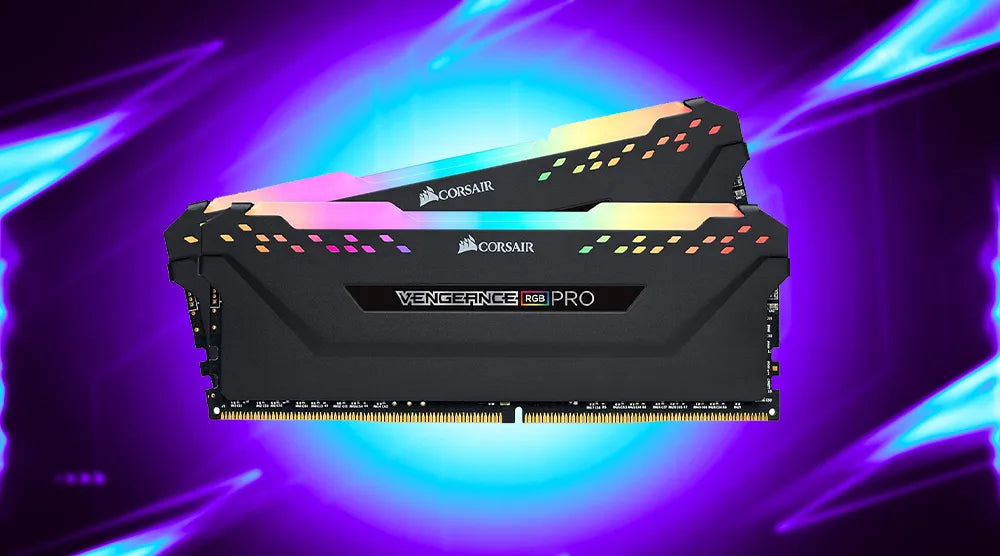Are you wondering, does RAM speed matter for gaming, or is it just marketing hype?
Random Access Memory (RAM) plays a critical role in how your system processes data, and its speed, measured in MHz, can influence how smoothly your games run.
But the real question is: how much of a difference does it actually make?
In this blog, we’ll explore what RAM speed is, how it’s measured, and whether it impacts gaming performance. We’ll compare high FPS vs. low FPS gaming, analyze RAM speed versus capacity, review real-world benchmarks, DDR4 vs DDR5, and recommend the best RAM speed for gaming in 2025.
What RAM Speed Is And How Is It Measured?
RAM speed refers to the rate at which your memory modules can read and write data. Usually measured in MHz, which reflects the number of cycles per second the RAM can process.
Two major variables determine RAM speed:
-
Higher MHz: It results in quicker data transfer.
-
CAS Latency (CL): The time lag between sending an order and getting data. Generally speaking, lower latency is preferable.
There are several generations of RAM:
-
The most popular requirement for most setups is DDR4.
-
Becoming increasingly popular in gaming setups is DDR5, the next generation featuring greater capacity and bandwidth.
Does RAM Speed Matter for Gaming?
Yes, but not as much as you might think. RAM does affect performance, but the effect depends on the kind of games and the rest of your system. Here's why:
-
In CPU-intensive games (like simulation or strategy games), quicker RAM can help performance by feeding the CPU information quickly.
-
In graphically demanding games, your graphics card is the limiting element; thus, RAM speed has less influence.
-
Competitive players chasing high FPS in eSports titles benefit more from faster RAM than casual gamers playing single-player AAA titles.
Capacity of RAM vs Speed of RAM
The most often asked question is whether gaming depends more on RAM Speed or RAM Capacity.
-
Capacity First: For most players, having enough RAM takes precedence over speed. Modern games require more memory; therefore, 16GB of 3200MHz RAM will surpass 8GB of 3600MHz RAM.
-
Speed Second: Once you have enough capacity (16GB+) for modern gaming, quicker speeds can yield incremental benefits, particularly in CPU-bound games.
Real-World Gaming Benchmarks
Benchmarks show that RAM speed may improve performance, but the benefits differ somewhat:
-
Titles like Cyberpunk 2077 or Red Dead Redemption 2 show little variation (2–5 FPS) between 3200MHz and 3600MHz.
-
Faster RAM brings clear FPS improvements (5–15 FPS) in games such as CS: GO, Valorant, or League of Legends.
-
Games like Civilization VI or Microsoft Flight Simulator that depend on strategy and simulation gain more from faster RAM rates.
For competitive gamers, every additional frame counts; the variance is not black and white.
DDR4 vs DDR5 for Gaming
By 2025, DDR5 RAM is steadily becoming the new standard, but how does it really compare to DDR4?
DDR4
-
Affordable and widely supported across most systems.
-
Common speeds range between 3200–4000 MHz, offering strong performance at a budget-friendly price.
-
Still delivers excellent value for gamers focused on FPS over multitasking.
DDR5
-
Starts at higher speeds, with 4800 MHz+ as the baseline.
-
Supports larger capacities per stick, making it ideal for multitasking and memory-intensive applications.
-
Comes with higher latency and cost compared to DDR4.
Ideal RAM Speed for Gaming in 2025
Your gaming style and budget will determine your ideal RAM speed:
-
For seamless performance, 16GB DDR4 at 3200MHz is still adequate.
-
For good balance, mid-range gaming calls for 16–32GB DDR4 at 3600MHz or DDR5 at 4800MHz.
-
32GB DDR5 at 5600MHz guarantees future readiness and top-tier FPS in competitive gaming.
Unless you're aiming for competitive eSports, first seek capacity, then speed.
Wrap Up
So, does RAM speed matter for gaming? The short answer is yes, but only after you’ve secured enough capacity. For most players, 16GB of RAM at 3200MHz will deliver smooth performance, while faster speeds provide incremental gains in CPU-heavy and competitive eSports titles. DDR5 RAM is paving the way for the future with higher bandwidth and multitasking power, but DDR4 remains a reliable and budget-friendly option.
Your choice depends on your gaming style, system requirements, and long-term goals.
Looking to maximize FPS, reduce lag, and future-proof your setup?
At Technoid Inc., we design gaming PCs optimized for speed, stability, and performance. Whether you want DDR4 value or DDR5 power, our experts can help you build the perfect gaming rig.
Contact us today and take your gaming to the next level!
FAQs
1. Does RAM speed affect FPS in all games?
Most probably not; it is more effective in CPU-bound and eSports games. GPU-heavy AAA games show less noticeable improvements.
2. What is better for gaming: 16GB 3200MHz or 8GB 3600MHz?
Always go for more capacity; 16GB at 3200MHz is superior to 8GB at 3600MHz in modern gaming.
3. Is DDR5 worth it for gaming in 2025?
Yes, but that would be for building a new system, with future-proofing in mind. DDR4 is still a good choice, but DDR5 has much higher bandwidth.
4. How much RAM do I require for gaming?
16GB is the minimum for fluid operation in modern gaming, while ideally, you would have 32GB for multitasking and future titles.

 United States
United States

